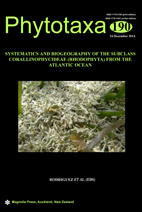Abstract
Based on new studies of the type and of specimens from various localities in the Atlantic, Indian and Pacific oceans, Porolithon onkodes was reaffirmed as a distinct species, but of variable morphological appearance. The following taxa were found to conform to the present-day diagnosis of P. onkodes and they are thus considered heterotypic synonyms thereof: P. antillarum, P. cocosicum P. pachydermum and P. sandvicense. Despite the suggested reproductive isolation of these taxa, there is no valid taxonomic reason for their separation as the characters considered diagnostic of P. onkodes were found to be present in all of them. Also, while molecular analysis using ITS sequence data has suggested that P. onkodes and P. pachydermum are distinct species, the complex and unpredictable evolutionary behaviour of ITS reduce its use for phylogenetic analysis. In many tropical Indo-Pacific and tropical eastern Atlantic regions, P. onkodes has been reported to be one of the single-most important ecological species because of its wide distribution. Similarly, P. pachydermum has been documented as one of the single-most important ecological species in many areas of the tropical and subtropical western Atlantic. As the two taxa are here shown to be conspecific, it is logical to suggest that P. onkodes is arguably one of the most widespread tropical to subtropical non-geniculate coralline algae. Porolithon onkodes not only occurs largely throughout the Indo-Pacific, but as a result of the present study, is now known to commonly occur throughout the tropical and subtropical regions of the eastern and notably western Atlantic Ocean.

